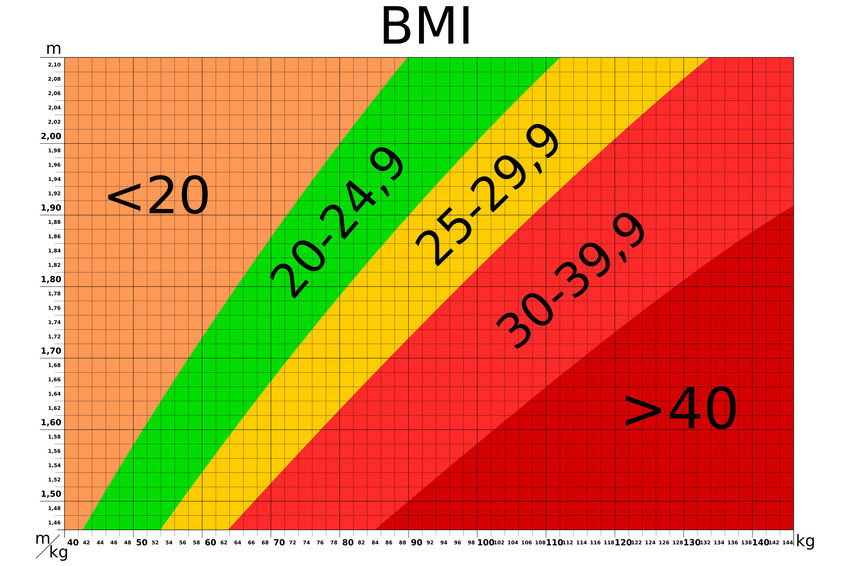
Men with a body mass index between 20 and 25 have the highest sperm count
Between 1996-1998, 1,558 young Danish men with a mean age of 19 years volunteered to produce a semen sample while they attended a compulsory physical examination to determine their fitness for military service[1]”https://www.ncbi.nlm.nih.gov/pubmed/15482761″.
What was measured
- Semen volume (in milliliters)
- sperm concentration (in million per milliliter)
- percentage of motile spermatozoa
- percentage of spermatozoa with normal morphology
- total sperm count (in million)
- testis size (in milliliters)
- serum reproductive hormones
Results
The study found that
- Serum testosterone, sex hormone-binding globulin (SHBG), and inhibin B all decreased with increasing BMI, whereas free androgen index and estradiol (the primary female sex hormone) increased in men with increasing BMI. Broadly interpreted, that means that a lot of body fat has a significantly negative impact on male hormone levels.
- Serum FSH was higher among slim men. Since FSH regulates the development, growth, pubertal maturation and reproductive processes of the body. This group is therefore considered more fertile.
- Men with a BMI <20 kg/m(2) had a reduction in sperm concentration and total sperm count of 28.1% and 36.4%, respectively. Very thin men are therefore less fertile than slim and men with normal level of body fat.
- Men with a BMI >25 kg/m(2) had a reduction in sperm concentration and total sperm count of 21.6% and 23.9%, respectively, compared to men with BMI between 20-25 kg/m(2). Overweight men were therefore also shown to be less fertile.
- Percentages of normal spermatozoa were reduced, although not significantly, among men a BMI below 20 and above 25.
- Semen volume and percentage of motile spermatozoa were not affected by BMI.
Conclusion
High or low BMI was associated with reduced semen quality. It remains to be seen whether the increasing occurrence of obesity in the Western world may contribute to an epidemic of poor semen quality registered in some of the same countries. If so, some cases of subfertility may be preventable.
www.amitamin.com/en/fertilsan-m New life deserves the best possible start!We provide the essential building blocks for this.
Single or multi-nutrients?
Every chain is only as strong as its weakest link. Whether a man is affected by low sperm count, poor motility or general poor sperm quality, it is most effective to take a combination product to make sure all sperm parameters and therefore the overall Total Motile Spermatozoa (TMS) count is maximised. TMS is the product of sperm count, motility and sperm volume and measures how many million sperm cells are motile in an entire ejaculate.
Fertility specialists therefore recommend that men should take a combination product, which includes several fertility nutrients. The nutrients are all affordable, well-tolerated and proven to be highly complimentary in their effectiveness improving multiple sperm parameters simultaneously.
Increasing nutrient intake to boost male fertility
With the effects of nutrients on male fertility well established, men wanting to start a family need to pay close attention to their diet.
Although the body can produce some amino acids such as glutathione, arginine, and carnitine, there is still a dietary requirement to sustain healthy levels. Trace elements, vitamins and minerals all need to be obtained through diet.
Although a balanced diet enriched with unprocessed foods can help to sustain the availability of nutrients necessary for healthy fertility, there can be limitations. For example, during periods of illness or prolonged stress, the body’s nutritional demands increase.
This can lead to a reduction in fertility. Lifestyle factors such as tobacco and alcohol use, insufficient sleep, excessive weight gain, and inactivity can all negativity affect fertility.
One of the easiest and most effective ways to ensure that the body has sufficient access to nutrients to support fertility is with supplements. There is a range of natural supplements that have been formulated with nutrients important for male fertility.
Men wanting to start a family are strongly encouraged to consider a dietary supplement to ensure that any fertility issues due to nutrient deficiencies are addressed. This is an effective, affordable, proven and convenient way to support male fertility – especially when considering the high costs and uncertain probabilities of fertility treatment such as IVF and ISCI.
Together with positive lifestyle adjustments, supplements can significantly help to improve conception rates.
Male fertility nutrients

Dr. Kooner is Deputy Director of The Advanced Fertility Center of Chicago and has been a Specialist in Fertility Treatment since 1999.
As well as the areas that the clinic specialises in general, he is particularly interested in managing oocyte donation, female same-sex couples, single women having sperm donation and those considering egg freezing.
Dr. Kooner regularly speaks at fertility meetings. He has published in national journals and constantly contributes to the fertility research and publications from Advanced Fertility Center of Chicago.
References
| ↑1 | ”https://www.ncbi.nlm.nih.gov/pubmed/15482761″ |
|---|














